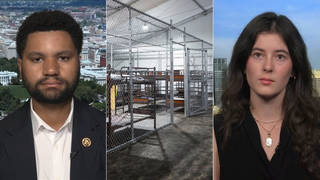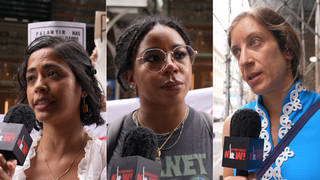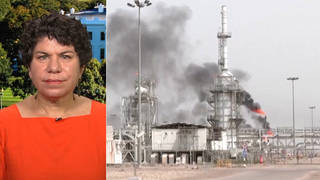
Guests
- Oliver Milmanenvironmental reporter at the Guardian US. His new piece is titled “Hurricanes will worsen as planet warms and sea levels rise, scientists warn.”
- Michael Manndistinguished professor of atmospheric science at Penn State University. His latest book, co-authored with political cartoonist Tom Toles, is titled The Madhouse Effect: How Climate Change Denial Is Threatening Our Planet, Destroying Our Politics, and Driving Us Crazy. Mann is also author of The Hockey Stick and the Climate Wars: Dispatches from the Front Lines.
While 2016 is on pace to become the warmest year on record, climate change has been largely ignored at the presidential and vice-presidential debates so far. We look at Donald Trump’s history of climate change denialism. He has called it a scam and a hoax. In 2012, Donald Trump tweeted: “The concept of global warming was created by and for the Chinese in order to make U.S. manufacturing non-competitive.” We speak to Guardian journalist Oliver Milman and Michael Mann, a distinguished professor of atmospheric science at Penn State University.
Transcript
NERMEEN SHAIKH: States of emergencies have been declared in Florida, Georgia and the Carolinas as Hurricane Matthew barrels towards the Southeast coastline. More than 2 million people have been urged to evacuate their homes. Many climate scientists are saying climate change has intensified Hurricane Matthew because warmer ocean waters help create stronger hurricanes.
During last week’s first presidential debate between Donald Trump and Hillary Clinton, moderator Lester Holt did not ask about climate change, but it came up once during a brief exchange.
HILLARY CLINTON: Take clean energy. Some country is going to be the clean energy superpower of the 21st century. Donald thinks that climate change is a hoax perpetrated by the Chinese. I think it’s real.
DONALD TRUMP: I did not. I did not.
HILLARY CLINTON: I think the science is real.
DONALD TRUMP: I do not say that.
HILLARY CLINTON: And I think it’s important—
DONALD TRUMP: I do not say that.
HILLARY CLINTON: —that we grip this and deal with it, both at home and abroad.
NERMEEN SHAIKH: That’s Hillary Clinton speaking last week at the presidential debate. And she references Trump talking about climate change as a hoax, which he subsequently denied, a hoax, he said, designed by China to undermine the U.S. economy. You have said that—Michael Mann, that Trump is, quote, “a threat to the planet.” So could you talk about the way that climate change has figured in this presidential election, and your comments on Trump?
MICHAEL MANN: Sure. It is unfortunate, as you folks have alluded to, that despite constituting perhaps the greatest challenge we face as a civilization—climate change—there has been no question about climate change thus far in the debates. So, we’re two down, two to go. We’ll see if it enters into the discussion in one of the subsequent debates. But it is literally the greatest challenge and threat facing human civilization. So, for the moderators to not ask a single question about climate change is indefensible, and it’s conspicuous.
It’s interesting, in that exchange, you heard Donald Trump say he didn’t say that. And it’s true: He didn’t say that climate change is a hoax perpetrated by the Chinese. He tweeted it. And that’s his primary mode of communication. And, in fact, he has tweeted at least a half-dozen times various climate change—you know, standard climate change denial talking points. The problem isn’t just Trump. You have, in his vice-presidential candidate, somebody who is also on record denying climate change. So it’s a climate change denial dream team—
AMY GOODMAN: Let’s—
MICHAEL MANN: —Mike Pence and Donald Trump. Yeah.
AMY GOODMAN: Let’s go to Donald Trump appearing on Hugh Hewitt Show last year, when he was asked about global warming.
HUGH HEWITT: Do you believe that the temperature of the Earth is increasing? And what would you do, if you do believe that, vis-à-vis global climate change?
DONALD TRUMP: Well, first of all, I’m not a believer in global warming. I’m not a believer in man-made global warming. It could be warming, and it’s going to start to cool at some point. And, you know, in the early—in the 1920s, people talked about global cooling. I don’t know if you know that or not. They thought the Earth was cooling. Now it’s global warming. And actually, we’ve had times where the weather wasn’t working out, so they changed it to “extreme weather,” and they have all different names, you know, so that it fits the bill.
AMY GOODMAN: And in December, Donald Trump was asked a similar question by Bill O’Reilly on Fox News.
BILL O’REILLY: Do you believe in global warming, climate change? Do you think the world’s going to change for the worse because it’s getting warmer?
DONALD TRUMP: I think that there’ll be little change here. It’ll go up, it’ll get a little cooler, it’ll get a little warmer, like it always has for millions of years. It’ll get cooler, it’ll get warmer. It’s called weather. I do believe in clean—and I’ve received—a lot of people don’t know this: I’ve received many environmental awards, many, many environmental awards, for the work I do. And I believe strongly in clean water and clean air. But I don’t believe that what they say—I think it’s a big scam for a lot of people to make a lot of money.
AMY GOODMAN: “A big scam.” And in 2012, Donald Trump tweeted: “The concept of global warming was created by and for the Chinese in order to make U.S. manufacturing non-competitive.” Oliver Milman, as we go through these clips of the man who could be president, could be elected in just five weeks?
OLIVER MILMAN: Yeah, I mean, as Michael alluded to, this is really the defining issue of our age. In a rational world somewhere, the media and all politicians would be focusing on climate change as a top priority instead of seeing it as just some kind of niche kind of sideshow to what they should be talking about. I mean, as recently as 2008, you had two presidential candidates who accepted that climate change is real, and something needs to be done. Both accepted there needs to be kind of some kind of price on carbon—John McCain and Barack Obama. Since then, we’ve seen one side of politics, unfortunately, descend into climate denialism, to the extent that it’s called a hoax dreamed up by the Chinese, which is, you know—any other time, would be laughable. Somebody who’s purporting to be the most powerful person in the world, it’s quite worrying.
AMY GOODMAN: I mean, it is really something. You have Haiti canceling their election on Sunday indefinitely because of this storm. You have some who are saying that the peace deal in Colombia, that was just voted down by just a sliver, may well have been deeply affected by climate change because of the weather in Colombia that caused so many people not to go out and vote. How, Michael Mann, this affects global politics, not to mention refugees, the largest number of refugees we’ve seen since World War II, how climate change weighs into this, whether or not presidential candidates believe it, or whether or not leading TV personalities who are moderating these debates even raise it?
MICHAEL MANN: Yeah. And, you know, Neil deGrasse Tyson, a great science communicator, I think, has put it very well. He says the wonderful thing about science is that it doesn’t matter whether or not you believe it; it’s still true. And so, while politicians like Donald Trump can say they don’t believe in climate change, they’re not entitled to their own facts. And the facts are in. There’s very widespread consensus among the world scientists that climate change is real, it’s caused by human activity, it’s already causing lots of problems, it will cause far more problems if we don’t do anything about it.
And you allude to sort of the repercussions, the national security and conflict repercussions, of climate change. The Syrian uprising was fundamentally related to a drought. And it’s had implications worldwide for instability, political instability. As a growing global population, 7 billion, maybe reaching 9, possibly even 11 billion by later this century—you’ve got a growing global population competing for less food, less water and less land as a result of climate change. And that is—to use the term again, it’s a perfect storm of consequences for instability, for conflict. And it is for reasons like that, and the fact that many of the poorest nations, like Haiti, are feeling the worst impacts—they have the least adaptive capacity, the least resilience to deal with impacts like this—this is going to create—you know, climate change impacts are going to create mass migration from regions which are no longer livable. That means, once again, more people in the remaining areas competing for resources.
It’s a national security and conflict nightmare. And our armed forces, our national security community here in the U.S. has recognized climate change as the greatest threat we face in the years ahead. So while politicians like Donald Trump are denying it even exists, our defense community, our national security leaders recognize that this is actually the greatest threat that we face in the decades ahead, from a national security standpoint, because it means more conflict, and conflict leads to global chaos and instability.
NERMEEN SHAIKH: Well, Michael Mann, despite what you said about the scientific consensus and what the national security leaders in this country say, a report by a U.K.-based research group, which surveyed 20 countries, including China and India, found that the United States had more climate change deniers among their respondents than any other country. So what do you think accounts for that?
MICHAEL MANN: Well, you know, what are the countries where we have the most powerful and entrenched fossil fuel companies and corporations? The U.S., Australia. And that’s where we see the most rampant climate change denial. It’s not coincidental. Fossil fuel interests are doing exactly what tobacco interests did decades ago. They have manufactured a campaign of misinformation and disinformation to confuse the public and policymakers from acting. In the case of tobacco, we know that millions of people died because the tobacco industry hid the adverse health impacts of their product. With climate change, many more people will suffer and perish if we don’t act. In some ways, the campaign by fossil fuel interests to confuse the public about the reality and threat of climate change is an even greater crime against, you could say, humanity or the planet. It’s literally a crime against the planet.
And we need to make sure that they’re answerable for the disinformation campaign that they have run. They’ve set us back decades. If we had acted on this problem when ExxonMobil’s own internal documents from the 1970s revealed that they recognized—this is their own words—they recognized the impacts of climate change could be catastrophic. These are in their own internal documents from the 1970s. But what did ExxonMobil do in the subsequent decades? They spent tens of millions of dollars on a disinformation campaign to deny the reality of climate change.
We can’t allow that. We have to move on. We have to hold bad actors accountable, and we have to move on to the worthy debate, which is what we should be debating in Congress: how to solve this problem. What are the mechanisms to decrease our carbon emissions and to transition to renewable energy? There’s a worthy political debate between progressives and conservatives to be had about that topic, but there’s no worthy debate to be had about whether the threat exists. We have to get past that. Again, in November, we may have an opportunity to try to get past that by electing leaders who will act on climate.
AMY GOODMAN: On Wednesday, President Obama announced a threshold had been passed for the ratification of the Paris Agreement to combat climate change. He hailed it as an historic day for protecting the planet.
PRESIDENT BARACK OBAMA: Today, the world has officially crossed the threshold for the Paris Agreement to take effect. Today the world meets the moment. And if we follow through on the commitments that this Paris Agreement embodies, history may well judge it as a turning point for our planet. … The Paris Agreement alone will not solve the climate crisis. Even if we meet every target embodied in the agreement, we’ll only get to part of where we need to go. But make no mistake: This agreement will help delay or avoid some of the worst consequences of climate change.
AMY GOODMAN: Oliver Milman, your final comment on the significance of this? And could a new president in the United States undo the Paris accord?
OLIVER MILMAN: Sure. So, you’ve got the biggest emitters in the world now have fully ratified the Paris deal, meaning they’ve committed to emissions cuts—so, U.S., China, India, so on, the U.K., European Union. In terms of the cuts, they need to be far more ambitious to get us to the—what the Paris accord sets out, which is a 2-degree Celsius limit on warming. And rapid transformation towards clean energy is required.
In terms of undoing it, Donald Trump has promised to do—to exit the U.S. from the Paris deal. That won’t be actually possible for the next four years, because the U.S. is locked in because of its ratification. But regardless of that, the emissions cuts need to be far steeper if the world is going to avoid the kind of dangerous climate change we’re seeing examples of through Hurricane Matthew and others.
AMY GOODMAN: Well, we’re going to leave it there. Oliver Milman, thanks for being with us, of Guardian US. Michael Mann, Penn State, congratulations on your new book, The Madhouse Effect: How Climate Change Denial Is Threatening Our Planet, Destroying Our Politics, and Driving Us Crazy. Stay with us, folks.
[break]
AMY GOODMAN: “Too Hot to Handle” by Heatwave. Songwriter/producer Rod Temperton died last week at the age of 66. This is Democracy Now!, democracynow.org, The War and Peace Report. I’m Amy Goodman, with Nermeen Shaikh.













Media Options